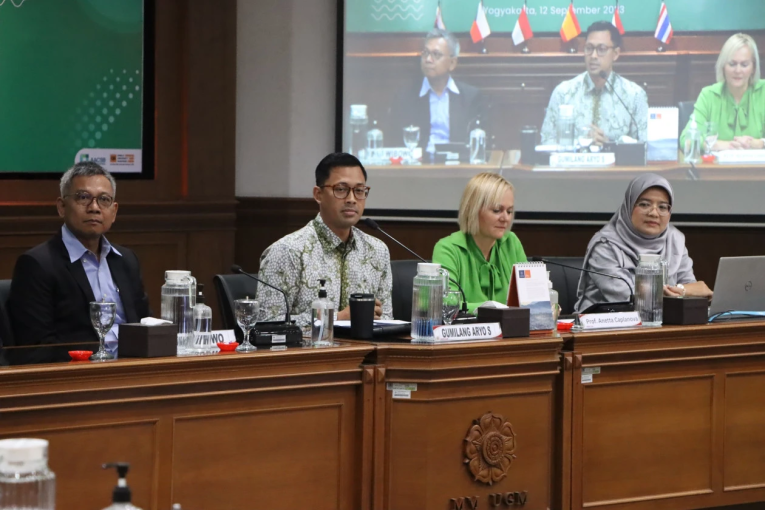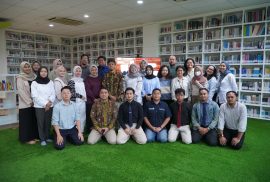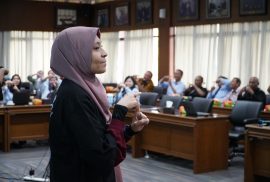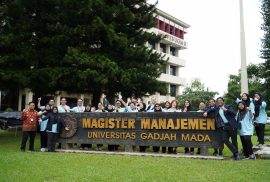
Eleven business schools from Asia and the European Union discussed Sustainability Curriculum Integration, which took place in the Faculty Meeting room, Master of Management Study Program, Faculty of Business Economics, Gadjah Mada University (MM FEB UGM), Tuesday (12/9). The eleven business schools are the MM FEB UGM study program, MM Indonesian Islamic University, MM University of Indonesia, and MM Trisakti University. Next, there is the International College of National Institute of Development Administration, Srinakharinwirot University, and Naresuan University Thailand; University of Economics in Bratislava, Slovakia; Universidad Pablo De Olavide, Spain; Eötvös Loránd University, Hungary; Mendel University In Brno, Czech Republic; and the University of Agder Norway.
Chair of the MM FEB UGM Study Program, Prof. Amin Wibowo, SE., MBA., Ph.D., said that this meeting of business school administrators, apart from creating opportunities for cooperation, also disseminated best practices in integrating sustainability aspects in the curriculum of Master of Management study programs in various parts of the world through collaborative activities of Master Studies in Sustainable Development and Management (MASUDEM) funded by Erasmus+. “This activity is an opportunity to introduce the MASUDEM program initiative as part of a collaboration between partner universities in Europe and Southeast Asia that supports the development of sustainability-based curricula,” he said.
Apart from discussing the introduction of the scope and objectives of the MASUDEM program, according to Amin, this meeting will present best practices in sustainability curricula from various countries and a mapping of the current situation of each collaboration partner university.
MASUDEM program coordinator, Prof. Anetta Chaplanova, from the University of Economics in Bratislava, Slovakia, said the MASUDEM project is a project co-funded by the European Commission through the Erasmus Plus program for capacity building in higher education that focuses on cooperation between European universities and universities in third world countries. “Our focus is on the Southeast Asia region, and in this project, we involve two countries in Southeast Asia, namely Indonesia and Thailand. “This collaboration is a partnership that we hope will provide skills, knowledge, and interest in the main focus of this project, namely the development of a master’s level curriculum in sustainable development and management,” he explained.
Apart from Indonesia and Thailand, said Anetta, business school partners in Europe were invited to conduct contextual studies to see best practices in teaching sustainability management and development economics at leading universities worldwide to prepare the basis for improving or developing new programs. Partner. “We are currently developing a master’s program that focuses on sustainable development and management. Not only that, this basis is also used to renew or improve existing programs in this field at partner universities. “We will then proceed with implementing the updated curriculum, and before that, we also need to accredit the programs if necessary,” he explained.
Meanwhile, Deputy Dean for Research, Community Service, Cooperation and Alumni, Faculty of Economics and Business (FEB) UGM, Gumilang Aryo Sahadewo, SE., MA., Ph.D., said cooperation between business schools on sustainability curriculum in context developing countries, but also encouraging how we can work together between developed and developing countries to understand sustainability issues. “I think efforts are needed to integrate sustainability into the curriculum. The impact is not only for the Master of Management in Indonesia and Thailand but also in other ASEAN countries and European countries. “We want to study the perspective of sustainability curricula from European countries,” he said.
According to Gilang, the MASUDEM program can increase opportunities for current collaboration between the Faculty of Economics and Business UGM and the University of Agder, namely the ASEAN Master in Sustainability Management program. According to him, this interdisciplinary and multidisciplinary program can train students to become potential leaders in sustainability issues in the ASEAN context.
“I think this collaboration will provide knowledge to pursue and perfect the sustainability curriculum. “And once again, I hope that administrators can share updates about the curriculum, not only in their respective countries but also in countries outside this network,” he hoped.
Author: Gusti Grehenson
Source: ugm.ac.id




